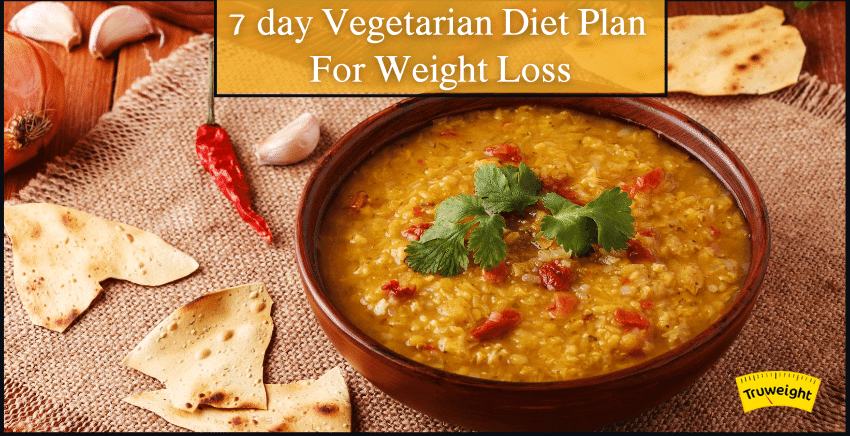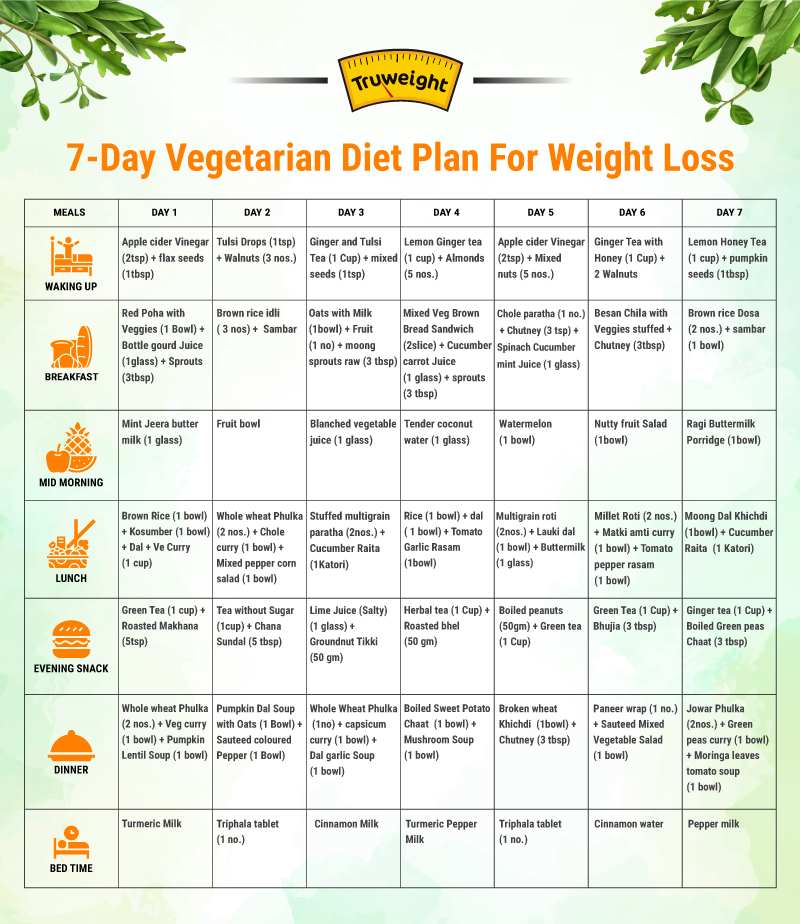Diet Plan for Weight Loss, Weight Loss
The Vegetarian Diet Plan: Weight Loss Meal Plan
Medically reviewed by Dr. Shunmukha Priya, Ph.D. in Food Science and Nutrition | Possible
Are you a vegetarian who is intensively looking for a perfect yet easy meal plan to lose weight?
We are glad to tell you that You’ve Arrived!!
The world is rapidly turning towards vegetarianism to follow a healthy lifestyle and protect the environment. Around 18% of the world’s population is identified as vegetarians. [1]
In this blog, we will discuss the benefits and risks of vegetarian diet plans for weight loss, frequently asked questions to dieticians, and more. We will also give you a Free 7-Day Complete Vegetarian Diet Plan for Weight loss by our head nutritionist.
Excited!!
Let’s go…
Know More
 It often turns out to be a challenging task for a vegetarian to find a perfect weight loss diet plan. Even if one can find a healthy vegetarian diet plan, it contains several food items that are not readily available in local Indian markets.
To solve this problem for you, we reached out to our head nutritionist and came up with a simple & perfect diet chart for vegetarians.
It often turns out to be a challenging task for a vegetarian to find a perfect weight loss diet plan. Even if one can find a healthy vegetarian diet plan, it contains several food items that are not readily available in local Indian markets.
To solve this problem for you, we reached out to our head nutritionist and came up with a simple & perfect diet chart for vegetarians.
Want to become the best version of yourself?
Learn to eat right with a customised meal plan.
Table of Contents
Introduction
In simple terms, a vegetarian diet is the one that does not include meat, poultry & byproducts of animal slaughter. People adopt vegetarianism for various reasons such as religious beliefs, health issues, environmental causes, respect for sentient life, etc. However, dairy products such as milk, curd, paneer, etc. are considered vegetarian. The majority of Indians are vegetarians with an estimate of 40% of the Indian population is pure vegetarian, while another 30% of the population consume meat occasionally. [2] [3] It has also been observed globally that people are rapidly converting to vegetarianism as it is the best way to stay healthy. Several studies published in the Journal of the American College of Nutrition [4][5] assures that vegetarianism reduces the risk of many serious health issues such as heart diseases, diabetes, PCOS, hypothyroid, etc. Athletes and bodybuilders are substituting meat for plant-based proteins to reduce the risk of Type 2 diabetes, cancer, kidney disorders, etc. It often turns out to be a challenging task for a vegetarian to find a perfect weight loss diet plan. Even if one can find a healthy vegetarian diet plan, it contains several food items that are not readily available in local Indian markets.
To solve this problem for you, we reached out to our head nutritionist and came up with a simple & perfect diet chart for vegetarians.
It often turns out to be a challenging task for a vegetarian to find a perfect weight loss diet plan. Even if one can find a healthy vegetarian diet plan, it contains several food items that are not readily available in local Indian markets.
To solve this problem for you, we reached out to our head nutritionist and came up with a simple & perfect diet chart for vegetarians.
Benefits & Risks of Vegetarian Food
Nothing is white or black; everything is grey, which means everything in this world has pros and cons, and we shouldn’t follow anything blindly. As they say, half knowledge is more dangerous than no knowledge. Here we address the health benefits and risks attached to a purely vegetarian diet: –Benefits of a vegetarian lifestyle
1. Weight loss
When you are on a vegetarian diet, your BMI would be lower than that of a non-vegetarian because vegetarian foods are lower in calories than non-veg. Studies across the globe have shown that a vegetarian diet is high in micronutrient content, low in fat, and comprises approximately 7 to 15% of total energy.[6, 7, 8] You can easily lose or maintain your weight with a healthy vegetarian diet. Also Read: Following An Extreme Diet? Beware! It Can Possibly Make You Fatter2. Healthy Heart
For a healthy heart, you need a healthy plate, and a vegetarian plate is an excellent choice. A veg diet is cholesterol-free and is low in saturated fat, which keeps you at a lower risk of cardiovascular disease. A vegetarian diet contains dietary fibre, complex carbohydrates, vitamins, minerals, polyunsaturated fatty acids, and phytochemicals. [9]3. Diabetes prevention and management
You can prevent diabetes with a vegetarian diet as it has lower sugar levels, and it makes your body more responsive to insulin. Diabetes patients are given vegetarian diet plans and superfoods to control, manage, or reverse the disease along with weight loss. Vegetarian diets have a high content of fibre, antioxidants, and phytochemicals. There is evidence that high consumption of fruits and vegetables can decrease the risk of developing T2DM. [10, 11] Moreover, whole grains contain the mineral magnesium, which is essential for regulating blood sugar [12]4. Hypertension
High Blood Pressure or Hypertension (BP) is a modifiable major lifestyle risk factor. There are a variety of mechanisms proposed by which plant-based nutrition leads to a decrease in blood pressure. They include improved vasodilation,[13, 14, 15, 16] greater antioxidant content and anti-inflammatory effects,[17, 18, 19, 20, 21, 22, 23, 24] improved insulin sensitivity,[25, 26, 27, 28, 29] decreased blood viscosity,[30, 31] altered baroreceptors,[32] modifications in both the renin-angiotensin,[33, 34, 35, 36] and sympathetic nervous systems[37, 38].5. Gastrointestinal diseases
Vegetarian Diet rich in soluble and insoluble fibres helps in treating gastrointestinal diseases such as gastrointestinal cancer, gallstones, diverticular disease, and constipation.[39]6. Healthy skin
As fruits and vegetables are high in fibre, antioxidants & water, they help improve your metabolism, improve your digestion, keep you hydrated, and flush out toxins (detoxification) and other unwanted chemicals from your body. Also Read: How To Detox Your Body In 8 Simple Ways!Demerits of the vegetarian diet
1. Nutritional Deficiency
A wrong composition of the vegetarian diet can cause nutritional deficiency disorders. If you do not focus on getting all essential nutrients from various fruits and vegetables and follow a monotonous vegetarian diet plan, you will lack in vitamin B, vitamin D, iron, protein, etc. You should follow a balanced diet to have sufficient essential nutrients, foods like pulses, spinach, cashew nuts help in getting iron, whereas foods like rajma, milk, soy milk, seeds help in getting protein.2. Lower bone mineral density
The elimination of animal products from the diet decreases the intake of some essential nutrients and may influence bone metabolism. However, vegetarian diets can also be equally healthy only if they are well balanced with a variety of foods.3. Great effort required
You need to put more effort in terms of time and knowledge to select the foods in a vegetarian diet especially when you are eating from out. We advise you to take help from a qualified Nutritionist.4. Requires supplementation
If your vegetarian diet is not well balanced, you need regular external supplementation for essential nutrients like vitamin B12, vitamin D, etc. Also read: Vitamin B12: A Key Player In Keeping The Body HealthySimple Vegetarian Diet Plan
Here’s a free 7-day vegetarian diet plan for weight loss by our Head Dietician, Dr. Sunmukha Priya:-5 Simple Tips to Lose Weight by Dieticians
1. Drink warm lemon water
Drinking warm water with a squeeze of lemon early in the morning aids in weight loss. It will rehydrate, detoxify, boost immunity, and improve your digestion. Researches have shown that polyphenol antioxidants found in lemons reduce weight. [8]2. Magic of black coffee
Black coffee has chlorogenic acid that helps the body keep the glucose absorption down from the food, which helps in weight loss. Fitness experts suggest that taking a cup of black coffee before exercise. Coffee has a psychoactive substance called caffeine that helps you energize and make the most out of your workout with less fatigue.3. Heavy breakfast & light dinner
- Two important things about breakfast:
- It should be the heaviest meal of the day, and by heaviest, we don’t mean the weight but the quality. It should be loaded with protein and other nutrients.
- You should never skip breakfast.
- Dinner should be the lightest meal. You should have vegetables and some grains for dinner.


